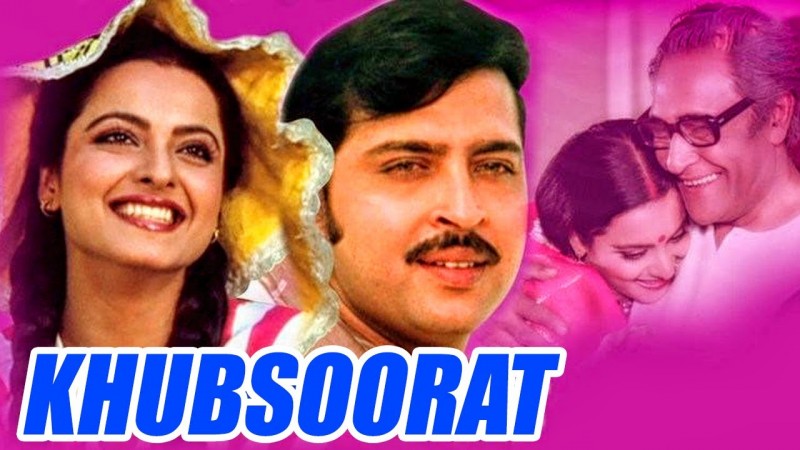
With his touching and enlightening films, Hrishikesh Mukherjee—one of the most renowned directors in Indian cinema history—left a lasting impression. "Khubsoorat" stands out as one of his biggest commercial successes among his body of work as a whole. This delightful family comedy-drama, which was released in 1980, served as a showcase for Mukherjee's storytelling and directing skills as well as his talent for getting the best performance from his cast as a whole. We will examine the plot, characters, performances, and lasting legacy of "Khubsoorat" in this article as we delve into the specifics of what made it a classic in Indian cinema.
The events of "Khubsoorat" take place inside the eccentric and disorganized Diwan family home. The stern and traditional matriarch who rules the household with an iron fist is called Nirmala Devi, and she is portrayed by the legendary Dina Pathak. Her second daughter-in-law, Chhaya (played by Ritu Kamal), is a rebellious spirit who frequently spars with her mother-in-law, whereas her eldest daughter-in-law, Manju (played by Ashok Kumar), is a devout wife who abides by the matriarch's strict rules.
The arrival of Manju, played by the bubbly Rekha, as the youngest sister in the story, introduces the plot twist. Manju is known for being vivacious and free-spirited, and her vivacity upsets the family dynamic. In the traditionally conservative Diwan family, her contagious laughter, outlandish outlook on life, and refusal to follow social norms cause waves of hilarity and chaos.
The conflict between generations and ideologies is at the center of the movie. Nirmala Devi is challenged by Manju's forward-thinking and contemporary outlook on life, which sparks a series of charming and endearing encounters. Manju's romantic interest in Nirmala Devi's son Inder (played by Rakesh Roshan) and her attempts to restore joy and happiness to the family are just two of the many subplots that the movie expertly weaves together.
Characters in "Khubsoorat" that are vividly drawn and brought to life by a top-notch cast are one of the film's strongest points. The movie's heart and soul are Rekha and her performance as Manju. Her endearing portrayal of a free-spirited woman who brings joy to those around her perfectly captures the essence of the character. Their on-screen chemistry, which gave their characters more nuance, is palpable and endearing. Ashok Kumar played the role of her love interest.
Acting mastery is on display in Dina Pathak's portrayal of Nirmala Devi. She convincingly portrays the strict and dictatorial matriarch, giving her character both a hateful and sympathetic quality. The central conflict of the movie is the conflict between Manju and Nirmala Devi, and Dina Pathak's nuanced performance gives this relationship even more depth.
The film's charm is greatly enhanced by the supporting cast, which includes David Abraham as the family physician Dr. Kailash, Ritu Kamal as Chhaya, and Rakesh Roshan as Inder. Their interactions and comedic timing give the story depth and humor.
Another distinguishing feature of "Khubsoorat" is its catchy soundtrack, which was written by Gulzar and was created by R.D. Burman. The songs, which include the upbeat "Aanewala Pal" and the sultry "Sun Sun Sun Didi," heighten the film's emotional impact. The music is an essential component of the overall experience because it perfectly enhances the storytelling.
The movie's work by cinematographer Jaywant Pathare is particularly noteworthy. With its elaborate interiors and lush gardens, he expertly captures the essence of the Diwan family mansion, creating a visual contrast between the traditional and the modern. The use of vivid colors and fine details in the sets enhances the visual appeal of the movie.
"Khubsoorat" offers insightful commentary on societal norms and familial dynamics in addition to being a comedic film. A major theme is the conflict between tradition and modernity, and Mukherjee questions patriarchy and long-standing traditions by using humor as a tool. Manju's persona stands for the winds of change that were sweeping through Indian society in the late 20th century, promoting women's independence and empowerment.
The significance of happiness and emotional health within a family is also discussed in the movie. It emphasizes the idea that laughter and love are necessary components for a peaceful home. A strong message about the importance of emotional ties is conveyed by Mukherjee's portrayal of the Diwan family's transformation from a rigid and unhappy unit to a joyful and cohesive one.
Upon its release, "Khubsoorat" was a huge commercial success and received positive reviews. It struck a chord with audiences of all generations and is still doing so today. The movie's enduring popularity is proof of Hrishikesh Mukherjee's skill as a storyteller and the universal appeal of its themes.
One of the pivotal moments in Rekha's illustrious career remains her portrayal of Manju. Her persona came to represent the modern Indian woman who rejects social conventions in favor of living life to her own terms. Subsequent films that investigated similar themes of family dynamics and societal change clearly showed the film's influence on Indian cinema.
"Khubsoorat" is a masterpiece of a movie that perfectly displays Hrishikesh Mukherjee's mastery of narrative. The movie continues to be cherished by viewers of all ages thanks to its endearing characters, excellent performances, melodious music, and thought-provoking themes. It serves as evidence of Mukherjee's skill in fusing humor with social commentary and continues to be a delightful and timely film experience, demonstrating that great cinema is in fact timeless.
Shah Rukh Khan's Epic 'Mohabbatein' Decision